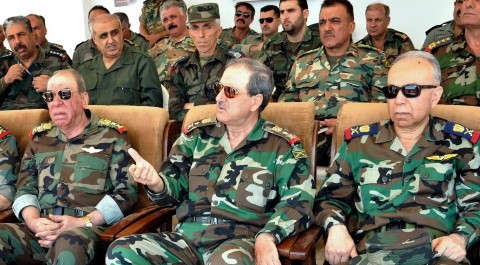PHOTO: Syrian Defense Minister Daoud Rajha, later killed in a bombing, with Army officers in July 2012
Kheder Khaddour, writing for the Carnegie Middle East Center, offers an explanation for the continuing loyalty of most Syrian Army officers to the Assad regime — it’s all about housing:
The Syrian army’s officer corps has remained intact despite the immense pressure of nearly four years of civil and military conflict, a fact that has prevented the fall of Syrian President Bashar al-Assad’s regime. The military housing system is a crucial aspect of this cohesion: it reveals the world Syrian officers inhabit, their relations with the regime and wider Syrian society, and the reasons why so few have defected so far.
While there have been defections in the infantry, no major fighting unit has broken away en masse, as defection on this scale would have required the participation of middle- to high-ranking officers. Indeed, the core of the officer corps continues to stand by the regime of Syrian President Bashar al-Assad. The fact that a majority of officers are drawn from Syria’s Alawite community has often been noted as the primary, even singular, factor in the army’s cohesion since 2011. But this explanation overstates the role of sectarian affiliation.
Army officers have access to a benefits system that links nearly every aspect of their professional and personal lives to the regime, and this places them in an antagonistic relationship with the rest of society. Dahiet al-Assad, or “the suburb of Assad” northeast of Damascus and the site of the country’s largest military housing complex, reveals how this system works.
Known colloquially as Dahia, the housing complex provides officers with the opportunity of owning property in Damascus. As many army officers come from impoverished rural backgrounds, home ownership in the capital would have been beyond their financial reach. Military housing has offered them an opportunity for social advancement, but the community that officers and their families inhabit within Dahia also fosters a distinct identity that segregates them from the rest of Syrian society, leaving them dependent on the regime.
The benefits Dahia provides come at a steep cost. With the move into military housing, officers effectively complete their buy-in, linking their personal and familial fortunes to the survival of the regime. All the trappings of an officer’s life, and the social respectability it provides, are thus granted by and dependent on the regime. In 2000, when then-President Hafez al-Assad died, many officers in Dahiet al-Assad sent their families back to their home villages to wait out the succession outcome. The families only returned once Hafez’s son Bashar was confirmed as the new president. Officers had understood that their life in Damascus was contingent on the Assad regime’s survival, rather than on their status as state employees or military personnel.
Syria’s military housing programs were greatly expanded during the 1980s, but in the decades since, they have not fostered a sense of solidarity among officers from different sects, especially Alawites and Sunnis. Nonetheless, military housing benefits had the de facto effect of drawing officers together to protect their common financial interests after the start of the 2011 uprising.
Dahia’s haphazard development suggests that its role in cementing regime loyalty was not a deliberate choice but rather an inadvertent outcome of years of mismanagement and nepotism. The regime has thus been able to capitalize on the suburb’s internal corruption and isolation from wider Syrian society to strengthen its ties with the officers living there and secure their unyielding loyalty. As the uprising descended into full-scale civil war, the ghettoization of the officer corps has played out in the regime’s favor and prompted many officers to regard the revolution as a personal threat to their assets and livelihood.
Protecting a beneficial system, rather than adhering to strict ideological loyalty, is what has kept the Syrian officer corps largely intact. While there have been individual defections among officers living outside of the military housing system, as of mid-2015 there has been only one recorded instance of an officer leaving Dahiet al-Assad to join the opposition—and he was already retired.1 The neighborhood has morphed from a residential area into something more akin to a fortified military base—one that officers perceive as defending them collectively, and by extension the entire army and Syrian regime.

